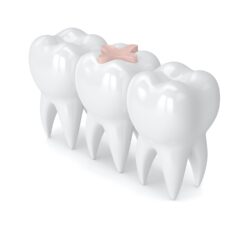Cavities will affect a majority of people at some point in their lives. You likely already received treatment for this early stage of tooth decay in the form of a dental filling. But you might not know what this fixture in your tooth does for your oral health.
The filling, usually made from cured composite resin, fills a hole in the tooth left after a dentist drills away decay from a cavity. The cavities will be gone for good after this treatment, and the filling keeps the newly vulnerable part of your tooth protected from further harm. Read on to learn more about how dental fillings restore your smile after cavity treatment.

How Long Do Dental Fillings Last?
A dentist makes a dental filling from malleable composite resin in most cases. It molds to fit the hole in the tooth, and then the dentist cures it to harden it and seal it into place.
The filling acts as cement to remain firmly in this part of the tooth, restoring its shape and function. But though durable, a filling will not endure forever. It can stay within the tooth for about ten years with proper care and maintenance.
You can eat and perform other oral functions as you normally would when you have a filling. But to get the most out of this treatment, you will need to take proper care of your oral health.
Can You Break a Dental Filling?
A dental filling could become loose, break, wear down, or dislodge due to abnormal pressures on your tooth and dental work. If this occurs, the protective seal around the vulnerable part of the tooth breaks. The tooth is then in danger of further harm from plaque, bacteria, and other harmful residues.
You will need to call your dentist for urgent repair or replacement of a damaged dental filling. They can then give you either a new filling or dental crown for more comprehensive coverage over the area.
Biting at an awkward angle or on a hard item will create a harmful level of pressure that could hurt a filling. Chronic grating from bruxism could also lead to this damage to your dental work. Pay attention to your oral habits to protect your dental health.
How Do I Care for Dental Fillings?
You can take care of dental fillings to maximize their restorative benefits with good overall oral habits. This means practicing good oral hygiene. Otherwise, plaque can remain on your teeth, eating at your dental structure, which can impact the fit of your filling.
You should also steer clear of pressures that could damage your dental filling. So if you have trouble avoiding these actions, like teeth grinding, talk to your dentist for assistance.
To allow the filling to settle into place as well as possible, follow aftercare instructions from your dentist directly after receiving your filling. Contact your dentist if you notice discomfort or abnormal side effects for prompt treatment.
